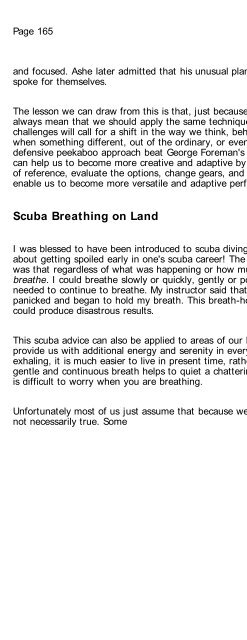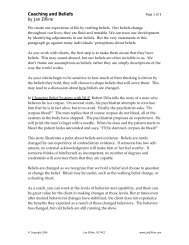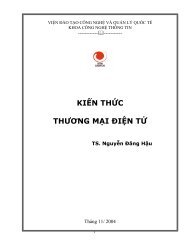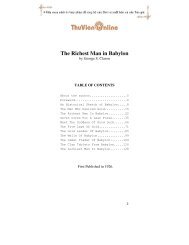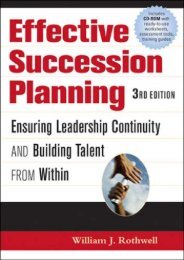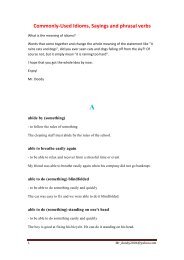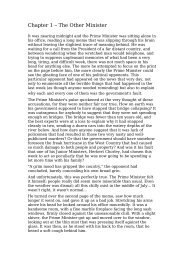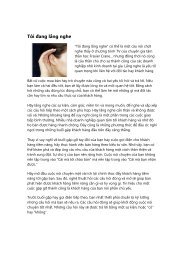1. The 15-Second Principle
1. The 15-Second Principle
1. The 15-Second Principle
Create successful ePaper yourself
Turn your PDF publications into a flip-book with our unique Google optimized e-Paper software.
Page 165<br />
and focused. Ashe later admitted that his unusual plan probably looked suicidal; however, the final results<br />
spoke for themselves.<br />
<strong>The</strong> lesson we can draw from this is that, just because we reach a certain level of proficiency, it doesn't<br />
always mean that we should apply the same techniques and strategies to every situation. Certain<br />
challenges will call for a shift in the way we think, behave, and approach our goals. <strong>The</strong>re will be times<br />
when something different, out of the ordinary, or even opposite is called for. Isn't this how Muhammad Ali's<br />
defensive peekaboo approach beat George Foreman's offensive approach in Zaire? <strong>The</strong> <strong>15</strong>-<strong>Second</strong> <strong>Principle</strong><br />
can help us to become more creative and adaptive by reminding us to stop, step outside our normal frame<br />
of reference, evaluate the options, change gears, and choose the most appropriate tactics. This, in turn, will<br />
enable us to become more versatile and adaptive performers.<br />
Scuba Breathing on Land<br />
I was blessed to have been introduced to scuba diving while visiting the Great Barrier Reef in Australia. Talk<br />
about getting spoiled early in one's scuba career! <strong>The</strong> most valuable piece of scuba instruction I received<br />
was that regardless of what was happening or how much fear I was feeling, I should always continue to<br />
breathe. I could breathe slowly or quickly, gently or powerfully, with relaxation or nervousness, but I<br />
needed to continue to breathe. My instructor said that the only time I would really be in trouble was if I<br />
panicked and began to hold my breath. This breath-holding would set up a dangerous environment that<br />
could produce disastrous results.<br />
This scuba advice can also be applied to areas of our life on land. A continuous breathing pattern can<br />
provide us with additional energy and serenity in every aspect of our lives. By continuously inhaling and<br />
exhaling, it is much easier to live in present time, rather than dwelling in the past or future. In addition, a<br />
gentle and continuous breath helps to quiet a chattering and frenetic mind. For some mysterious reason it<br />
is difficult to worry when you are breathing.<br />
Unfortunately most of us just assume that because we are still alive, we must be breathing properly. This is<br />
not necessarily true. Some


